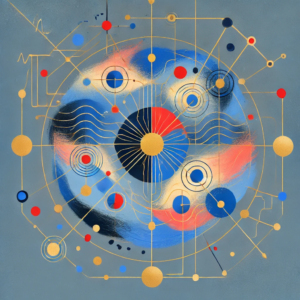
Bioelectricity: The Cognitive Glue Underpinning Cellular Collective Intelligence and the Probable Foundation of the Initial Sense of Self
by: H. Asif M.D
The concept of bioelectricity as the underlying mechanism that integrates cellular collective intelligence and potentially serves as the foundation for the initial sense of self is gaining traction in scientific literature. Bioelectricity, which refers to the electrical potentials and signals within and between cells, plays a crucial role in coordinating cellular activities and ensuring coherent functioning of biological systems.
Researchers such as Michael Levin have extensively studied the role of bioelectricity in cellular communication and regeneration. Levin’s work demonstrates that “cells use bioelectric signals to make decisions about growth, form, and healing, effectively exhibiting a form of collective intelligence” (Levin, 2020). This cellular decision-making process is not just a biochemical affair but deeply intertwined with electrical signals that guide cells in complex behaviors and structural organization.
Moreover, bioelectricity has been posited as a key factor in the emergence of a primordial sense of self. According to a study by Baluška and Levin (2016), “the bioelectric code is a plausible precursor to more complex cognitive functions, potentially laying down the groundwork for the sense of self at a cellular level.” This idea suggests that the electrical activity among groups of cells could form the basis of an elementary awareness or proto-cognition, which, over evolutionary time, could give rise to more sophisticated forms of self-perception.
Donald Ingber, a pioneer in the field of cellular mechanotransduction, also highlights the importance of electrical phenomena in cellular processes. Ingber (2006) notes that “cells and tissues are integrated systems where mechanical, chemical, and electrical signals converge to create a coordinated response,” indicating that bioelectricity is integral to the cohesive functioning of biological organisms.
The concept of bioelectricity as the cognitive glue suggests that it is not merely a facilitator of cellular activities but a foundational element in the development of a self-referential system within biological entities. This perspective opens new avenues for understanding how simple bioelectric interactions could scale up to form the complex neural networks responsible for higher-order cognition and consciousness.
In summary, the emerging view is that bioelectricity acts as a cognitive glue, providing the necessary coherence and coordination for cellular collective intelligence and possibly serving as the initial scaffold upon which the sense of self is built. This hypothesis is supported by the work of researchers like Levin, Baluška, and Ingber, who collectively underscore the centrality of bioelectric signals in the orchestration of life at both the cellular and systemic levels.
References:
- Levin, M. (2020). Bioelectric signaling: Reprogramming cells and tissues with endogenous voltages. Trends in Molecular Medicine, 26(4), 303-319.
- Baluška, F., & Levin, M. (2016). On having no head: Cognition throughout biological systems. Frontiers in Psychology, 7, 902.
- Ingber, D. E. (2006). Cellular mechanotransduction: Putting all the pieces together again. FASEB Journal, 20(7), 811-827.

Good https://is.gd/tpjNyL
https://datasphere.ru/club/user/120/blog/6608/